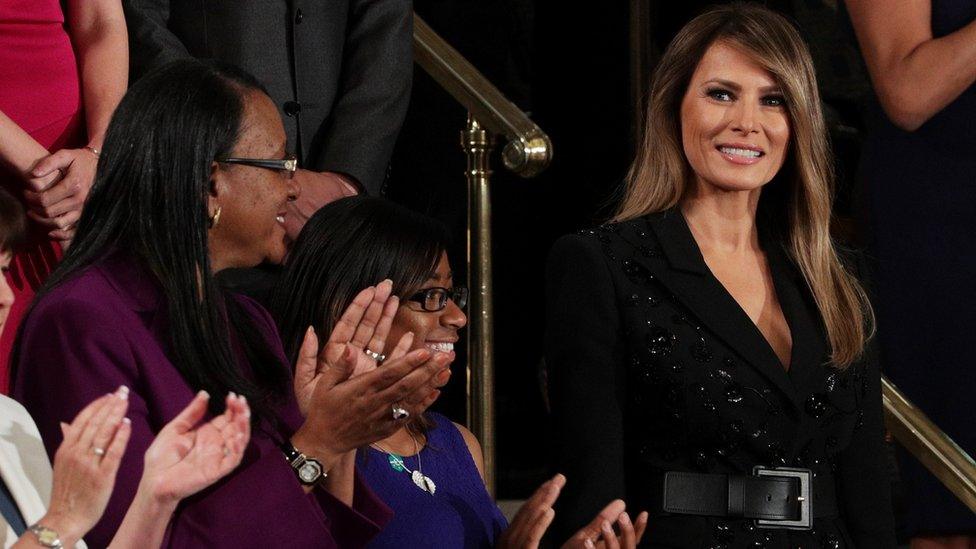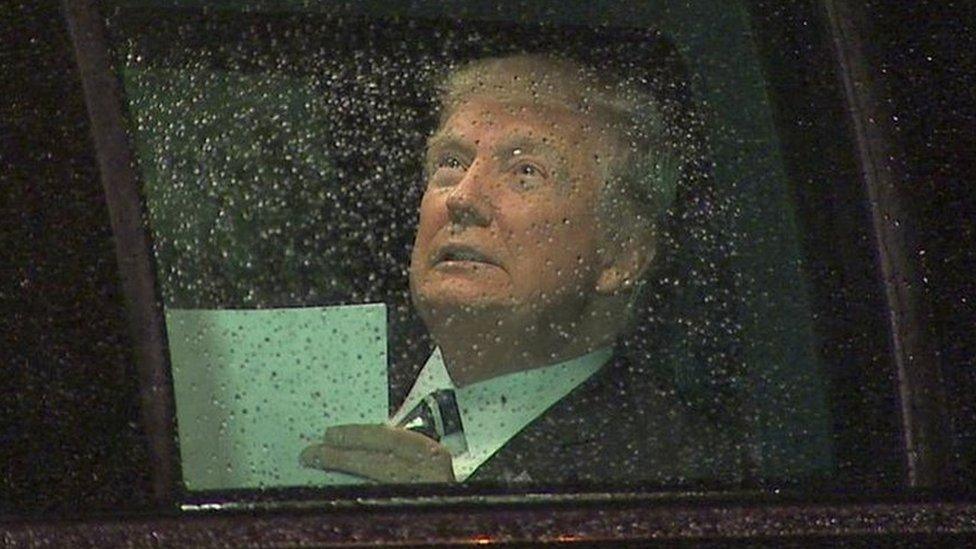Trump speech to Congress promises 'renewal of American spirit'
- Published
Donald Trump called for unity, but Democrats were less than impressed
President Donald Trump has said the US is witnessing a "renewal of the American spirit", as he delivered his first speech to Congress.
Adopting a measured, upbeat tone, the Republican president spoke of a "new chapter of American greatness".
Mr Trump condemned recent vandalism of Jewish cemeteries and a shooting in Kansas that left an Indian man dead.
His primetime address sought to bolster his low approval ratings after a bumpy start to his fledgling presidency.
At the outset of Tuesday night's hour-long speech, Mr Trump tackled recent suspected hate crimes, saying "we are a country that stands united in condemning hate and evil in all its very ugly forms".
Trump voters in Pennsylvania were ecstatic after the speech
On immigration, he dangled the intriguing possibility of a major policy shift towards a goal that eluded his two predecessors, insisting that "real and positive" reform was possible.
That line came hours after he told news anchors off the record at a White House lunch that he might be open to granting legal status to undocumented immigrants.
Carryn Owens, the widow of fallen Navy Seal, Ryan Owens, was brought to tears
In his remarks on Capitol Hill, the president also talked tough on the issue, pledging to make US communities safer "by finally enforcing our immigration laws".
He defended his early actions in office, touting his moves to withdraw the US from the Trans-Pacific Partnership trade deal and order work to start on a US-Mexico border wall.

Remarkably unremarkable - Anthony Zurcher, BBC News, Washington
It was a conventional presidential address, delivered conventionally. Any other year, that would be unremarkable.
In the age of Trump, however, where the ordinary seems unlikely, Tuesday night's proceedings proved decidedly unexpected.
Many of the ideas were the same - the calls for increased border security, the denunciation of illegal immigrants, the pledge to rebuild the US by buying American and hiring American, the warning that US allies must pay their fair share - but the delivery was smoother. For once, Donald Trump's delivery was spoken, not shouted.
As is typical of such addresses, the text was light on policy and marinated in cliches and political pabulum, touching on most of Mr Trump's agenda in vague generalities.
The president did lay down some markers, however, particularly on priorities in the upcoming healthcare overhaul, the size of his infrastructure spending plan and, at least elliptically, his support for border taxes.
In the end Mr Trump did no harm and may have helped ease the concerns of Republicans rattled by a rocky start to his administration. Now Congress has to turn those promises into reality. Even with this speech, it will not be an easy task.

In other highlights:
Mr Trump said the US "strongly supports Nato", but members of the alliance "must meet their financial obligations"
He outlined a blueprint for an Obamacare replacement that included ensuring access to coverage for those with pre-existing conditions
Mr Trump promised "massive tax relief for the middle class", though he offered little in the way of specifics
He asked Congress to pass a $1tn (£800bn) infrastructure package
The president drew loud applause when he railed against the so-called Islamic State and promised to "extinguish this vile enemy from our planet"

More on Trump's presidency:

But the most thunderous ovation of the night came when a war widow wept as Mr Trump paid tribute to her husband.
Navy Seal Ryan Owens died in a controversial US raid on a suspected al-Qaeda base in Yemen, days into Mr Trump's presidency. Some 25 Yemeni civilians, including children, were also reported to have been killed, leading to questions over the operation's readiness and effectiveness.

Among US First Lady Melania Trump's (R) guests were three California residents whose relatives were killed by people in the US illegally
The navy seal's father refused to meet President Trump when his son's body was returned home last month.
"Ryan's legacy is etched into eternity," Mr Trump told the grieving Carryn Owens, who sobbed and looked upwards.
It was one of the rare moments when lawmakers on both sides of the aisle applauded.
Despite the president's appeal for both parties to "unite for the good of our country", Democratic lawmakers mostly sat in silence or openly laughed at parts of the speech.
President Trump: "What we are witnessing today is the renewal of the American spirit"
Mr Trump's feel-good rallying cry for national unity, some noted, was in stark contrast to his doom-laden inauguration speech of a month ago.
In his concluding remarks, the president - whose political honeymoon has been soured by acrimonious spats with the media - said "the time for trivial fights is behind us".
Among US First Lady Melania Trump's special guests in the gallery were three California residents whose relatives were killed by people in the US illegally.
At least a dozen Democrats brought as their guests young undocumented immigrants who came to the US as children.
President Trump: "Real and positive immigration reform is possible"
Former Kentucky Governor Steve Beshear delivered the Democratic rebuttal to the speech, accusing Republicans of planning to "rip affordable health insurance" from Americans and being "Wall Street's champion".
In a Fox News interview broadcast earlier on Tuesday, Mr Trump gave himself an overall "A plus" for effort, adding that "in terms of messaging, I would give myself a C or a C plus".
According to a CNN/ORC poll of about 500 speech watchers, 57% said they had had a very positive reaction, external to President Trump's Congress address, with seven out of 10 saying they believed his policies would move the US in the right direction.
His popularity, however, has hit a historic low for modern presidents after a month in office - just 44% of Americans think he is doing a good job, according to RealClearPolitics.
Mr Trump's young presidency has been overshadowed by missteps including a high-profile court defeat to his controversial travel ban and the firing of a top aide.

President Trump appeared to rehearse his speech as he left the White House bound for Congress